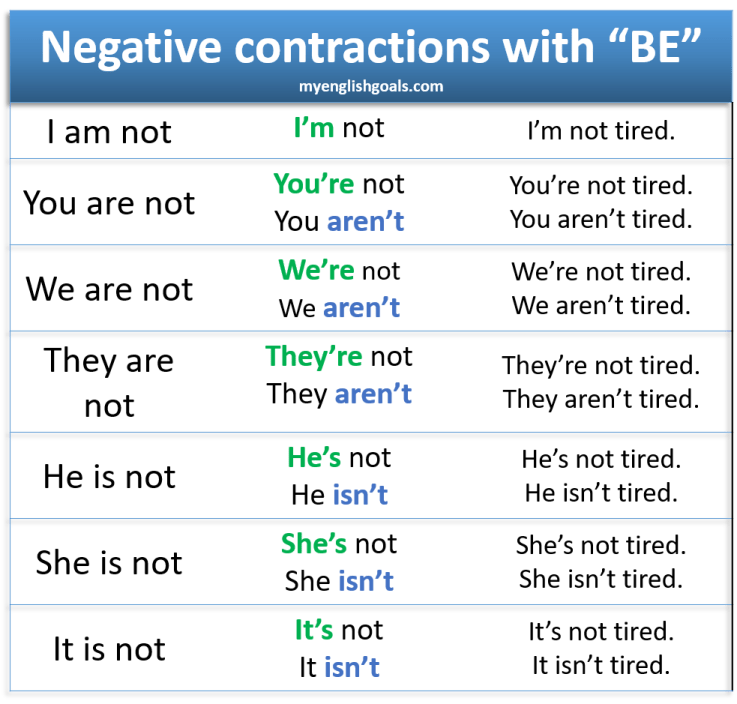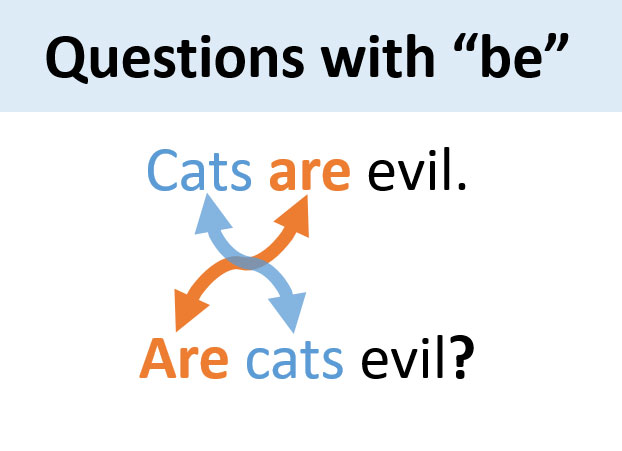-
- Las palabras y oraciones en inglés
- Los tipos de palabras esenciales para hablar inglés
- La estructura de oraciones en inglés
- Los pronombres personales
- El presente simple
- El presente simple
- Oraciones negativas en el presente simple
- Preguntas en el presente simple
- El verbo "be"
- El pasado simple
- El pasado simple
- Verbos irregulares en el pasado
- Pasado simple negativo e interrogativo
- "Be" en el pasado
- El futuro y verbos auxiliares
- El futuro simple
- Verbos auxiliares
- El presente continuo y perfecto
- El presente continuo
- El presente continuo para expresear el futuro
- El presente perfecto
- Contractions
- Adjetivos, adverbios y preposiciones
- Los adjetivos
- Los adverbios
- Las preposiciones
- Preposiciones de lugar
- Preposiciones de tiempo
- Los artículos
-
- Module 1
- There is - There are
- El comparativo
- El superlativo
- El imperativo
- Gerundios
- Question tags
- For, Since, Ago
- Have you ever...? How long have you...?
- Used to, be used to, get used to
- Used to vs would
- Have to vs Must
- I'd like y would you like?
- El pronombre "it"
- Too / Either, So am I / Neither am I
- Reported Speech
- La voz pasiva
- Expresar propósito
- I want you to... I told you to...
- Adjetivos y Pronombre Posesivos - Apostrophe 's
- Pronombres reflexivos
- Contables y No Contables
- This, That, These, Those
- One, Ones
- Collocations
- Adjetivos con -ed vs -ing
-
- Pronombres avanzados
- Some y Any
- Pronombres indefinidos
- No, None y Any
- All y Every
- Both, Either, Neither
- Cantidad y comparaciones
- Much, Many y A lot of
- A little y A few
- Not as...as
- Give me that book vs Give it to me
- Good at, Bad at
- Tiempos verbales avanzados
- Cuándo usar el presente perfecto
- Presente perfecto continuo
- Pasado continuo
- Pasado Perfecto
- Pasado perfecto continuo
- Verbos auxiliares
- will vs shall
- Will vs going to
- Will be doing vs will have done
- Can, could, be able to
- must vs can't
- May vs Might
- Los condicionales
- Zero conditional
- First Conditional
- Second Conditional
- Third conditional
- Introducción a los Phrasal Verbs
-
Premium
- Module 1
- Phrasal Verbs Upper intermediate
- Have to vs Must Upper intermediate
- Could have, should have, would have
- Should vs Must
- Have vs Have got
- Had better vs It's time
- Mixed conditionals Upper intermediate
- If I had known vs I wish I had known
- The Passive Voice
- have something done
- Verb + to vs Verb + ing
- Verbs that must be followed by ing
- Verbs that must be followed by to
- Prefer vs Would Rather vs Would Prefer
- No point in vs Not Worth
- When to use "the"
- Possessives 's' vs 'of'
- "Of mine" vs "My own" vs "On my own"
- There and It
- Each vs Every
- Relative clauses with who/which/that
- Relative clauses without who/which/that
- Relative clauses with whose, whom and where
- Advanced Relative Clauses
- Participle clauses
El verbo "be"
En las lecciones anteriores has aprendido cómo usar el presente simple, pero hay una excepción muy importante que tenemos que aprender: el verbo "be". Este verbo no sigue las reglas que todos los otros verbos siguen, pero es quizás el verbo más importante y más usado en inglés.
Be = Ser y Estar
El verbo "be" equivale a 2 verbos distintos en español: "ser" y "estar". Por ejemplo:
- Be happy (ser feliz)
- Be a teacher (ser profesor)
- Be German (ser alemán)
- Be ready (estar listo)
- Be tired (estar cansado)
- Be crazy (estar loco)
Cómo conjugar el verbo "be"
Como ya sabes, los verbos normales se conjugan en el presente simple de una forma muy simple: añadiendo una "s" para "he", "she" y "it". Pero el verbo "be" es diferente.

Do You Really Know Your Family? A Fun Family Game Filled with Conversation Starters and Ch...
$24.99| Pronoun | Be | Contraction |
| I | am | I'm |
| You | are | You're |
| We | are | We're |
| They | are | They're |
| He | is | He's |
| She | is | She's |
| It | is | It's |
Contractions
Las contracciones son dos palabras combinadas que se juntan con un apóstrofo. Ya has aprendido una, la palabra "don’t". Esta palabra es la combinación de las dos palabras "do not".
El verbo "be" tiene varias contracciones. Por ejemplo, en la oración "You are big", es exactamente igual decir "You’re big". Es opcional usar las contracciones, pero apréndelas porque son muy comunes y las escucharás mucho.
Ejemplos
- I am (I’m) – Yo soy / estoy
I am young. (Soy joven.)
I’m sad. (Estoy triste.) - You are (You’re) – Tú eres / estás, Usted es / está, Ustedes son / están, Vosotros sois / estáis
You are a friend. (Eres un amigo.)
You’re crazy. (Estás loco.) - We are (We’re) – Nosotros somos / estamos
We are here. (Estamos aquí.)
We’re students. (Somos estudiantes.) - They are (They’re) – Ellos son / están
They are tired. (Están cansados.)
They’re brothers. (Son hermanos.) - He is (He’s) – Él es / está
He is an actor. (Es actor.)
He’s ill. (Está enfermo.) - She is (She’s) – Ella es / está
She is pretty. (Ella es guapa.)
She’s in the car. (Ella está en el coche.) - It is (It’s) – es / está
It is in the box. (Está en la caja.)
It’s easy. (Es fácil.)
Cómo formar oraciones negativas con el verbo "be"
Hasta ahora hemos estado formando oraciones afirmativas con el verbo "be". Para crear oraciones negativas, solo hay que añadir la palabra "not". Por ejemplo:

Kids Against Maturity: Card Game for Kids and Families, Super Fun Hilarious for Card Game ...
$24.99- I am not tired. (No estoy cansado.)
- You are not a friend. (No eres un amigo.)
- We are not ready. (No estamos preparados.)
- They are not here. (No están aquí.)
- He is not crazy. (No está loco.)
- She is not an actress. (No es actriz.)
- It is not easy. (No es fácil.)
Contractions
En cuanto a las contracciones, tenemos la opción de juntar el sujeto con el verbo (ej. You’re not tired.) o el verbo con "not" (ej. You aren’t tired.). Ambas opciones son comunes y quieren decir exactamente lo mismo. A continuación verás todas las posibles contracciones del negativo.

Cómo formar preguntas con el verbo "be"
Para formar preguntas con el verbo "be", simplemente ponemos el verbo delante del sujeto. Por ejemplo, para convertir la oración "I am tired" en una pregunta, dirías "Am I tired?"

ENOKIK Galaxy Projector, Star Projector Built-in Bluetooth Speaker, Night Light Projector ...
$33.99
Más ejemplos:
- Am I dead? (¿Estoy muerto?)
- Are you real? (¿Eres real?)
- Are we friends? (¿Somos amigos?)
- Are they here? (¿Están aquí?)
- Is he family? (¿Él es familia?)
- Is she sad? (¿Ella está triste?)
- Is it easy? (¿Es fácil?)
Haz al menos 2 ejercicios para completar esta lección

Taco Cat Goat Cheese Pizza
$9.84
 Diario
Diario